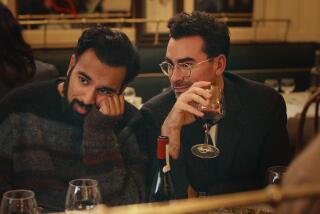‘Love Happens’
- Share via
You’d be hard-pressed to find a title more seriously scared of passion or life’s randomness than “Love Happens,” and the movie it belongs to falls squarely into that category of Hollywood product fatally intimidated by unpredictability. That this superficial romance between a successful self-help author and a nurturing florist is also a film about overcoming the tragedy of losing a loved one only makes its clichéd insipidity that much more irksome.
Aaron Eckhart plays Burke Ryan, a widower who, three years on from his wife’s passing in a terrible car accident, is a star grief expert who can sell out a convention hall with his workshops and speeches but -- surprise, surprise -- doesn’t heed his own coping advice in private. (He’s not smiling! Alcohol is his cure-all!)
Burke’s shark-y agent (Dan Fogler) has a big multimedia deal in the works, but when Burke bumps into pretty, melancholy-eyed Eloise (Jennifer Aniston) arranging flowers at the hotel, he sets a course for pursuit that will invariably force him to address his heartache issues, but only after they have their adorable date watching a concert from a telephone truck crane. And we know his issues are bad and potentially revelatory because Martin Sheen walks up to Burke after one of his speeches and calls him a hypocrite. He’s his late wife’s father. Ouch.
Well-intentioned as a movie like “Love Happens” is, co-writer and director Brandon Camp seems more interested in going through the motions of meet-cute, spar, connect, fall away, reunite than in treating his characters as complicated individuals in a messy process of recovery. Plus, the portrayal of Burke’s bereavement-managing empire is glib enough (his signature, book-titled phrase is “A-OK”) so you can’t tell if it’s supposed to be a hokey cult-of-personality operation or just cliché-ridden pap.
The only mourning of any significance is what’s happening to Aniston’s acting career, which has regrettably careened from charming comic luminescence on “Friends” to the promise of her performance -- and choice in scripts -- in “Friends With Money” to blandly propping up male leads in so-so movies. Here, saddled with a character whose bad-relationship past is quickly jettisoned because it can’t possibly measure up to a handsome, famous man’s all-consuming grief, Aniston threatens with each passing minute to become as perfunctorily decorative as one of her character’s lobby-ready bouquets. (Eloise, whose big psychoanalytical assist to Burke at the climax is “Give yourself a break,” also writes dictionary words like “quidnunc” in pen on hotel walls, a quirk whose origins were perhaps meant for another movie.)
Eckhart, meanwhile, is too square-jawed slick to come off as anything but a hot-dog salesman enduring a fallow stretch before coming out on top once more. Then again, in the movie’s super-structured depiction of grief recovery, the possibility that he ruin his impending Dr. Phil-dom is considered more gasp-inducing than bouncing back emotionally, and guilt-racked meltdowns are never inconvenient enough to ever truly disturb anyone, including the person going through it.
Outpourings come with perfect “aw”-factor timing, and grand-gesture confessions are met with self-congratulatory clapping, smiles and monetary riches. One of the more egregiously dramatized emotional breakthroughs occurs when one of Burke’s seminar attendees, a downtrodden contractor (John Carroll Lynch) paralyzed by the death of his son, finds the strength to go on when he shops freely at Home Depot, his fellow workshoppers in tow. The only thing missing from this crassly commercialized sequence is a jingle and a fade-out leading into “Extreme Makeover: Home Edition.”
If only Hollywood could learn to let go of movies like this. We all know it can. It just has to move forward. You can do it, Hollywood!
More to Read
The biggest entertainment stories
Get our big stories about Hollywood, film, television, music, arts, culture and more right in your inbox as soon as they publish.
You may occasionally receive promotional content from the Los Angeles Times.










